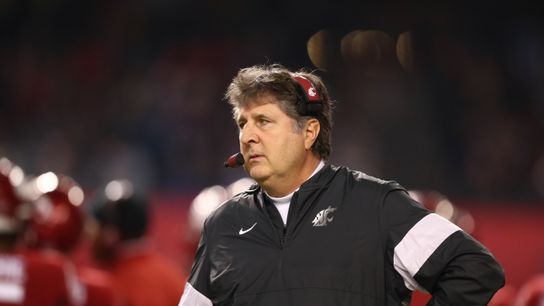I spent my formative years in the college football industry listening to every word Mack Brown spoke to the media twice -- once live, and then again as my fingers served as the vessel to take his words from tape recorder to computer screen. He had a number of pet phrases and anecdotes, and among them was the things he barred himself from doing as head coach -- venturing to the academic portion of campus and talk politics. As a third-generation coach, Brown learned long ago he'd need the support of Republicans and Democrats to win on Saturdays. This made sense to me at the time.
Then there is Mike Leach's position on the issue, which, consistent with many things between the two men, could not be more different than Brown's. “I think people in general are afraid to take a position on things, and I think it’s sad that our country drifted in that direction,” Leach told USA Today. “Some of that started with political correctness. You know, nobody is allowed to say anything unless everybody agrees on it, and we have to guess whether or not they’re going to agree on it before we ever say it. That’s ridiculous. That’s not the country we signed on for and that’s not why not we say the Pledge of Allegiance and have the First Amendment.”
Leach stumped for Donald Trump ahead of the Washington state primary, a throwback to a time, as pointed out by Brent Schrotenboer of USA Today, when Joe Paterno aggressively campaigned for George H.W. Bush and former Colorado head coach Bill McCartney, in a Buffs sweater, called homosexuality “an abomination of almighty God," in 1992. (He apologized in 2010.)
Fast forward to today, and the political rhetoric among college football coaches has completely cooled. In fact, it's non-existent. The only coach outside of Leach to endorse a presidential candidate during primary season was Urban Meyer -- who endorsed Ohio governor John Kasich in perhaps the most risk-free political statement in American history.
Texas A&M takes the practice of political absenteeism one step further by contractually prohibiting its coaches from endorsing political candidates or causes. “The rationale is that coaches are state employees, and they cannot be seen as attempting to influence, elections or political donations,” A&M associate AD Jason Cook told the paper.
The logic, as was Brown's, is clear: coaches have enough to worry about without alienating large swaths of their fan base.
Still, Paterno said that his job as a head football coach "doesn't make me a non-citizen."
